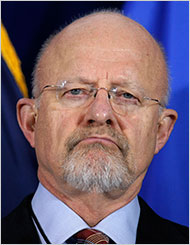In Senate testimony on Tuesday, the US’s most senior intelligence officials reiterated their conclusion that Iran has not decided to develop nuclear weapons and that its strategy is essentially defensive in nature.
 “We do not know if Iran will eventually decide to build nuclear weapons,” Director of National Intelligence James Clapper told the Senate Intelligence Committee.
“We do not know if Iran will eventually decide to build nuclear weapons,” Director of National Intelligence James Clapper told the Senate Intelligence Committee.
However, Clapper explained, the intelligence community’s assessment is that “Iran is developing nuclear capabilities to enhance its security, prestige, and regional influence and give it the ability to develop nuclear weapons, should a decision be made to do so.”
This analysis conforms to the long held conclusion that Iran’s goal is to bring itself within the range of nuclear weapons capability, in order to signal to its adversaries that it could develop nuclear weapons rather quickly if it ever decided to do so. Essentially, the strategy is meant to serve as a deterrent without having to violate Iran’s treaty obligations prohibiting proliferation.
“Iran prefers to avoid direct confrontation with the United States because regime preservation is its top priority,” Clapper said.
“Technical advancements” in Iran’s nuclear capacity “strengthens our assessment that Iran has the scientific, technical, and industrial capacity to eventually produce nuclear weapons,” Clapper explained, making “the central issue its political will to do so.”
Iran has repeatedly addressed the issue of its political will to build nuclear weapons – specifically, that it does not exist. The Islamic government of Iran has decreed in a religious fatwa that such indiscriminate weapons are a sin and forbidden by Islam.
And again, on Tuesday, Iranian news agencies quoted Vice President Mohammad Reza Rahimi as saying, “Iran plans to declare in the United Nations that it will never go after nuclear bombs.”
Despite progress in their nuclear capabilities, Clapper said, “we assess Iran could not divert safeguarded material and produce a weapon-worth of WGU [weapons grade uranium] before this activity is discovered.”
Again describing Iran’s posture as defensive in nature, Clapper added that Tehran views its conventional missile capabilities as “an integral part of its strategy to deter – and if necessary retaliate against – forces in the region, including US forces.”


